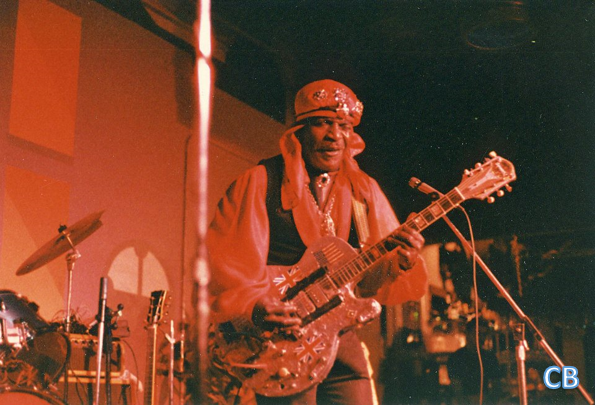Recommended Blues Recording
Bobo Jenkins – Detroit Blues That Matters
Bobo Jenkins – Decoration Day Blues – Soul Jam Records 806191
In a recent Baby Boy Warren recording review, I attempted to explain the vitality of the Detroit blues scene post-war, and how the city’s blues artists and their collective quality output, aside from John Lee Hooker’s, didn’t, and still doesn’t, get as much notoriety as it should. Small labels such as J-V-B, Battle, Von, Staff, Prize, Fortune, Hi-Q, Prize, and Strate-8, were churning out insistent urban blues melded from the influences of the southern U.S. and its oppressive ways coupled with the new life found by Detroit’s blacks in the northern urban environment. While Chicago got much of the period’s press for its powerhouse blues recording efforts, and rightfully so, Detroit and its blues artists were creating a collective blues phenomenon all their own. It never received the fair acknowledgment it should have, partially due to the immense achievements of the Motown machine, but its contributions to the blues are significant and important nonetheless.
Enter Bobo Jenkins. Jenkins, an Alabamian by birth, came to Detroit in 1944 after he was discharged from the military. He was not a man to shy away from work, and held jobs with the Packard Motor Car Company, and the Briggs Manufacturing Company, at which he stayed for 26 years. Jenkins also ran a vehicle repair garage, and was a photographer. As if that weren’t enough, Jenkins also ran his own recording studio, plus had his own record label named Big Star.
Jenkins had a musical background stemming from his boyhood days in the family church where he sang, and at the young age of nine, he formed a gospel quartet that also sang in churches, but in addition, performed at funerals. While in Detroit, at the urging of John Lee Hooker, Jenkins got a guitar and started playing.
Another key figure in Jenkins’ development as a bluesman in Detroit was Eddie Kirkland. Kirkland is credited with providing Jenkins with guitar tips and instruction during his formative time with the instrument.
This 21-track collection does not represent all of Jenkins’ recorded output. However, for anyone not familiar with Jenkins’ brand of blues, it is a highly-worthwhile gateway into his music. The cuts here embody the work that Jenkins completed for the Chicago powerhouse Chess label, the Chicago-based Boxer label, the Detroit label, Fortune, and Jenkins’ own Big Star label. While the CD presents songs culled from 4rpm and 78rpm sources, overall, the sound quality is very good; the remastering process was very effective.
There are three blues that Jenkins is most widely known for, and they are all provided here. “Democrat Blues”, a 1954 selection was released on the Chess label. The fine “Ten Below Zero”, a 1957 cut, saw the light of day on the Fortune label. And “Bad Luck & Trouble”, a 1954 blues, was on the Chess label. One additional song deserving mention is “Tell Me Where You Stayed Last Night”, a blues released on Jenkins’ Big Star label.
This CD allows the listener to easily trace the growing confidence Jenkins enjoyed as he continued to record, and the continuing growth in his guitar skill set. It is apparent, and represents Jenkins’ ever-growing confidence as his recording career progresses forward.
Jenkins’ voice, while not as deep as some blues singers, was a commanding tool, nevertheless. He sang his blues in a declamatory style. As with any blues song of merit, the lyrics are highly important, and one will never be challenged to hear and feel the story any given Jenkins blues song advances.
Worthy of mention is the variety of accompanists to Jenkins and his varied recordings. In Chicago, notable bluesmen Eddie Taylor, Willie Johnson, and Earl Phillips provided fine support. In Detroit, Albert Washington and James “Rabbit” Johnson provided their solid guitar work to Jenkins’ efforts, as did harmonica player Robert Richard. Also, interesting to note is that on three cuts, names perhaps known to modern-day blues fans assisted Jenkins; Sarah Brown (bass), Fran Christina (drums), John Nicholas (guitar), and an area favorite here in my hometown area, Steve Nardella (harmonica). Others played in support of Jenkins, as well.
It should be noted that this collection includes three alternative versions of released songs.
It bears repeating: Detroit’s contributions to the blues have historically been underappreciated. The city provided the perfect melting pot of black blues ability post-war as jobs were sought in the northern urban centers by a populace fleeing the oppressive southern U.S. And the early Detroit blues practitioners laid the groundwork for all the great Detroit area blues artists who followed them. Detroit blues was much more than just John Lee Hooker, and as this excellent collection highlights, there was much more blues to savor. Compilations such as this can begin to bring the importance and influence of Detroit blues to a wider understanding.
Did I mention that Bobo Jenkins was married ten times? Ten times! How can you not have the blues with that matrimonial track record!
Seek this one out! You will not be disappointed. Highly-recommended!

